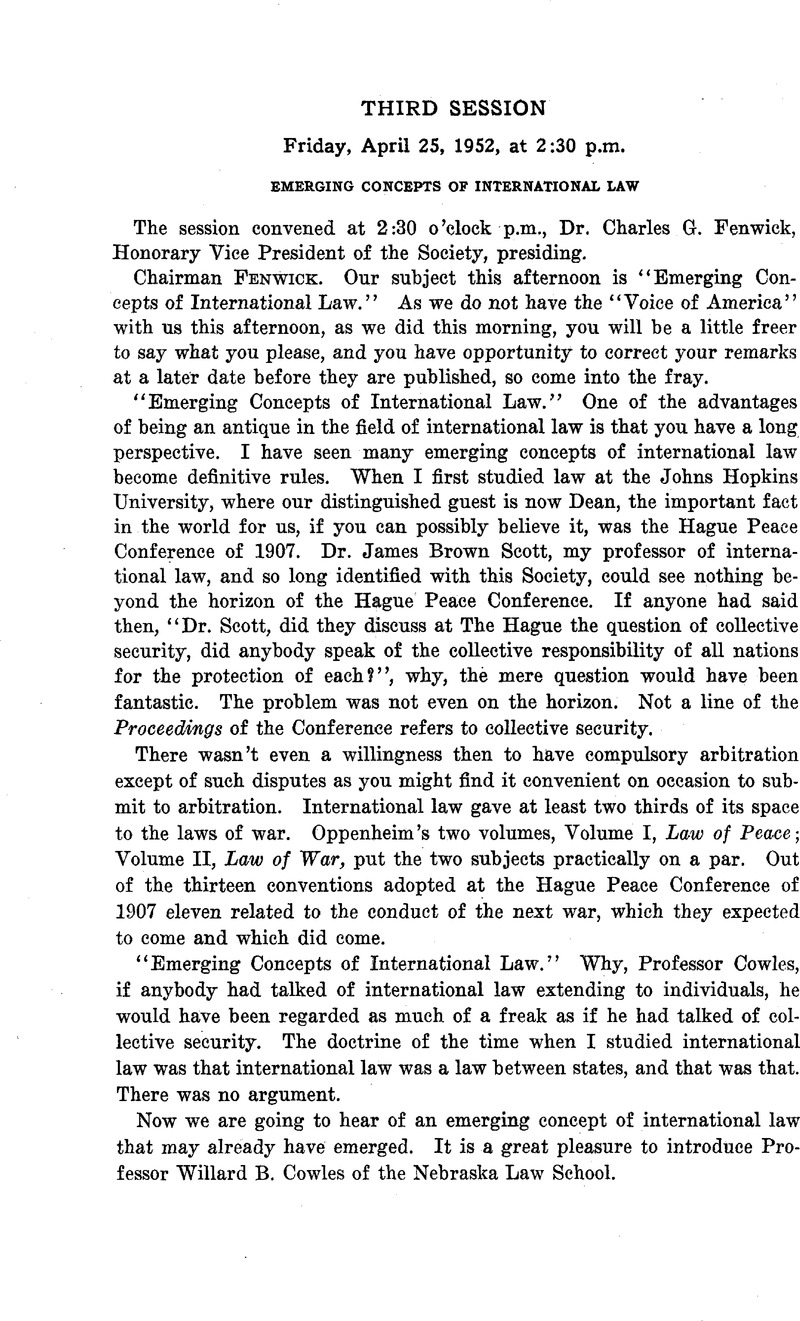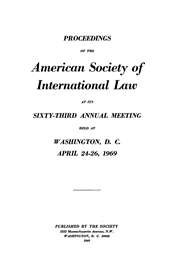Article contents
The Impact of International Law on the Individual
Published online by Cambridge University Press: 27 February 2017
Abstract

- Type
- Third Session
- Information
- Copyright
- Copyright © American Society of International Law 1952
References
1 Page 1.
2 Oppenheim, , International Law (1912 ed.), Vol. I, 4384, p. 455. See also id., §1 Google Scholar.
3 For a learned paper on this subject delivered earlier before this Society, see Edvard Ilambro, “Individuals before International Tribunals,” PROCEEDINGS, AMERICAN SOCIETY 01’ INTERNATIONAL LAW, 1941, p. 22 et seq.
4 Legnano, Traetatus de Bello [1360] (translation, Carnegie Endowment for International Peace). Unless otherwise stated, future page citations to the classical writers refer to the pagination of the Carnegie Endowment translations.
5 The members of this seminar were Ray B. Cumming, Esq., William H. Tewell, Esq., and Major Jean A. Wolf, J.A.G.C.
6 Ayala, The Law of War and the Duties Connected with War and Military Discipline, p. 88.
7 Ayala, op. cit., p. 56.
8 Gentili, De Legationibus (1594), p. 58.
9 “As one who does not kill an enemy in battle, but takes him prisoner, seems thus to wish to keep him alive (and from this, as though from a tacit promise, the captive derives a kind of right, so that he may not afterward be killed).” (Gentili, De Jure Belli [1612], p. 216.)
10 “Baldus, Romanus, Alexander, Jason, and Cagnolus teach that an offender who is taken in another’s territory, must be set free, even if his flight began in territory where capture was allowable, inasmuch as at the end the situation is different.” (Gentili, Hispanicae Advocationis [circa 1612], p. 21. See also id., p. 18.)
11 “ The law of nations safeguards not only the dignity of the one who sends, but also the safety of the one who is sent; therefore there is a tacit agreement with the latter also. Accordingly a wrong is done to the one who is sent, even if no wrong is done to the one who sent him.” (Grotius; De Jure Belli ao Pads [from trans. of 1646 ed.], p. 447.)
12 Grotius, op. cit., pp. 643-646.
13 “Since private citizens have private rights, which they can place under obligation, and enemies are capable of acquiring right[s], what can stand in the way of the obligation, Add that, unless this rule is established, opportunity is given for slaughter, an impediment is set to liberty. For captives in many cases will not be able to guard against the former, or to obtain the latter, if the good faith of private persons has been done away with. Still further, not only is a pledge, which has been given to an enemy, recognized by the law of nations but also a pledge to a brigand or to a pirate, just as we have said above in regard to public faith.” (Grotius, op. cit., p. 851.)
14 Zouche, An Exposition of Pedal Law and Procedure or of Law between Nations, p. 50x.
15 Zouche, op. cit., pp. 154–155.
16 Rachel, The Law of Nature and Nations, p. 187.
17 Rachel, ibid.
18 Rachel, op. cit., p. 189.
19 Textor, Synopsis of the Law of Nations, p. 126.
20 Textor, op. cit., p. 74.
21 See, e.g., Textor, op. cit., p. 127.
22 Pufendorf, De Jure Naturae et Gentivm, pp. 1149-1150.
23 Vattel, The Law of Nations, p. 3.
24 Vattel, op. cit., p. 144.
25 Vattel, op. cit., p. 317.
26 Vattel, ibid.
27 Vattel, op. cit., p. 139.
28 1 Kent 39 (45). These statements are taken from the 11th edition (1867) of James Kent’s Commentaries on American Law. The first page citation is from the basic pagination of the work. The figures which follow in parentheses indicate the relevant page in the 11th edition.
29 Id. at p. 44 (52).
30 Id. at p. 36 (38).
31 Id. at p. 80 (86).
32 M. at p. 170 (173).
33 Id. at p. 112 (117).
34 Wheaton, Elements of International Law (from Carnegie trans. of Dana’s 1866 ed.), pp. 26-27.
35 Manning’s work was first published in 1839. The cited excerpts are taken from Sheldon Amos’ “New Edition” of William O. Manning, Commentaries on the Law of Nations (pp. 204-206), published in 1875.
36 Twiss, Rights in Time of War (2d ed. rev., 1875), p. 126.
37 Id., at pp. 154–155.
38 Id., at p. 446.
39 Id., at p. 439.
40 General Order No. 100, Par. 94.
41 Lorimer, , The Institutes of the Law of Nations (1884), Vol. II, pp. 72, 73 Google Scholar.
42 Lorimer, op. cit., pp. 64-65.
43 Maine, , International Law (New York, 1888), p. 105 Google Scholar.
44 Maine, op. cit., p. 149.
45 Westlake, , International Law (2d ed., 1913), Vol. II, p. 37 Google Scholar.
46 Westlake, op. cit., p. 160.
47 Baty, , The Canons of International Law (1930), p. 139 Google Scholar.
48 Paragraph 246.
49 For a study of international law as applied to subdivisions of federations (in English), see Vol. 74, Becueil des Cows, Academie de Droit International (1949, Tome I), p. 659 a seq.
50 All individuals may not have the same capacity for rights under international law; e.g., stateless persons may have less capacity than nationals.
51 See, e.g., 33 California Law Review (1945) 177 at 188-194; American Journal of International Law, Vol. 42 (1948), p. 299, at pp. 312-313.
52 Herman Oliphant.
53 American Bar Association Journal, Vol. 35 (1949), pp. 19, 21.
54 Collected Papers, Vol. 7 (1937), p. 136 at p. 137,
55 Series B, No. 15 (1928).
56 See, e.g., United States of America (Faulkner) v. United Mexican States, Opinions of Commissioners (1927), pp. 86, 90.
57 Gallegos v. Nebraska, 342 U. S. 55 (1951), 72 S. Ct. 141, 96 L. Ed. 82.
58 28 U.S.C. §1915.
59 U.S.Treaties 247, T.I.A.S. No. 2045; 70 U.N.T.S. 27; American Journal of International Law, Supp., Vol. 44 (1950), p. 90.
60 Art. VII. In addition, the convention specifies that the consul shall “have the right: (1) To interview, communicate with, and advise any national of the sending state; (2) to inquire into any incidents which have occurred affecting the interests of any national of the sending state; (3) to visit, upon notification to the appropriate authority, and have private access to any national of the sending state who is imprisoned or detained by the authorities of the receiving state; and (4) to assist any national of the sending state in proceedings before or in relations with the appropriate authorities of the receiving state or of any state, province, municipality, or of any local political subdivision thereof.”
61 In addition to substantive rights under treaties, aliens may, in the United States, for instance (where practically all the laws comport with international standards) derive rights from such sources as municipal ordinances, from the common law, from State statutes, State constitutions, Acts of Congress, the Constitution of the United States, customary international law, and the general principles of law recognized by civilized nations. It makes no difference whether positive evidence of the alien’s rights is found in local laws or constitutions which comply with international standards, or in international sources. They are all state acts of a relevant legal character.
62 229 N. Y. 222, 242 (1920).
63 36 Stat. 2199 at 2220 (1907); 2 Malloy at 2023 (1899) and at 2234 (1907).
64 Prior decisions of the Permanent Court of International Justice and the history of the clause reading that “the Court, whose function it is to decide in accordance with international law” which was inserted at the beginning of Sec. 1 of Art. 38 in the Statute as adopted for the International Court of Justice, indicate that the new clause has no special meaning apart from the specific content which follows.
65 See, e.g., Oppenheim, L., International Law (1912), Vol. I, pp. 4, 455-456 Google Scholar.
66 Even if the alien had no procedural rights whatsoever, it would be juristically confusing not to distinguish between substantive rights and remedies.
67 40 Law Quarterly Review (1924) 271, 274.
68 The Logical and Legal Bases of the Conflict of Laws (1949), p. 211.
69 From The Collected Papers of John Westlake on Public International Law (1914), p. 393 at pp. 410–412.
70 A person is such … because rights and duties are ascribed to him.” (Pollock, A First Book of Jurisprudence (1896), p. 108.)
- 2
- Cited by




